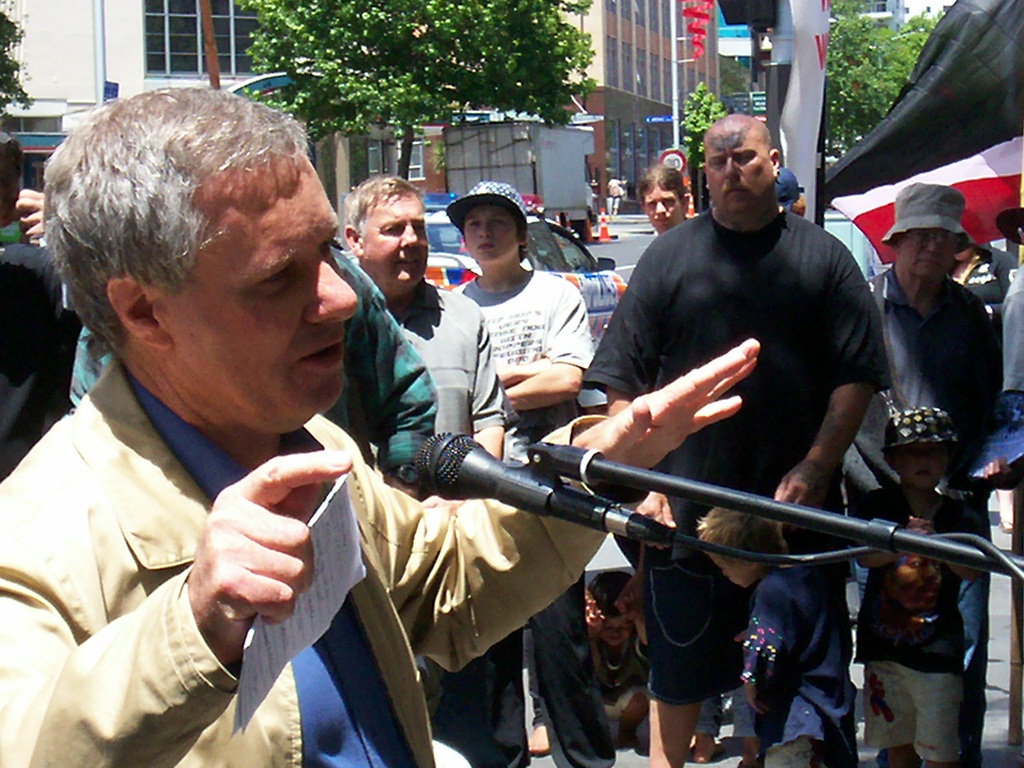[youtube http://www.youtube.com/watch?v=fWp-C5_169U]
After occupying a university council meeting room on Monday the 17th of October, We are the University came to these conclusions in a democratic process:
1. Free education, Zero Frees (Unconditional).
2. Sack Stuart McCutcheon and Patrick Walsh as vice chancellors of the University of Auckland and Victoria University respectively. Restructure university in a public forum.
3. Remove trespass orders on Marcus Coverdale and Wikatana Popata.
4. Decisions on courses be based on scholarly and social benefits rather than financial.
5. Security guards be employed for the safety of students, not survailliance. Cops not to be called in response to (non-violent) student activism.
6. The University management be bound by the government facilitation with the Tertiary Education Union (TEU).
7. University actively lobby to revoke the VSM bill
8. Government unconditionally fund student unions, allowing them to be a critical voice and conscience of society, so that corporatisation such as advertising is not necessary on campus spaces.
– We are the University Auckland
More videos from occupied VUW
[youtube http://www.youtube.com/watch?v=j1ethYFU1mE]
[youtube http://www.youtube.com/watch?v=8Uc2mg5oYPE]
Solidarity to everyone currently occupying together. Be rational and protest.
Unnatural disaster
Ian Anderson, Workers Party member
 The Rugby World Cup finally has a competitor for national coverage, but it’s unlikely to inspire millions. On October the 5th, container vessel MV Rena ran aground off the coast of Tauranga; within a week, a 5-kilometre oil slick was killing wildlife. To say the least, this does not look good for the current government. In a mystifying sign of the times, capitalist rag the Dominion Post even ran the front-page head-line “People Power,” covering clean-up efforts by citizens in light of reportedly negligent bureaucracy. However for all their populism, the right-wing press doesn’t dare discuss the cause of the problem: a system that alienates the people from the land, for profit.
The Rugby World Cup finally has a competitor for national coverage, but it’s unlikely to inspire millions. On October the 5th, container vessel MV Rena ran aground off the coast of Tauranga; within a week, a 5-kilometre oil slick was killing wildlife. To say the least, this does not look good for the current government. In a mystifying sign of the times, capitalist rag the Dominion Post even ran the front-page head-line “People Power,” covering clean-up efforts by citizens in light of reportedly negligent bureaucracy. However for all their populism, the right-wing press doesn’t dare discuss the cause of the problem: a system that alienates the people from the land, for profit.
Like so many unnatural disasters, the spill lays class divisions bare. Rena is operated by the Mediterranean Shipping Company, which this year overtook Maersk as the largest global shipping line in terms of container capacity. In 2007 they were named shipping line of the year for the 6th time, due to their impressive capacity – this means fast, cheap, and plentiful commodities. To achieve this they must cut labour costs, and ignore ecological factors. Rena was a Flag of Convenience ship, meaning that it used a false national flag to dodge regulations, ignoring warnings from three inspectors before running aground. More than half the world’s commercial ships use flags of convenience.
Maritime New Zealand, funded in large part by transport conglomerates such as MSC, shows no interest in challenging the flag of convenience system. Like many so-called ‘regulators’ in bed with their industry, MNZ is far better at PR than implementing anything significant. Only the International Transport Federation and their comrades in the Maritime Union of New Zealand challenge the flag of convenience system, as they have done for decades.
By bringing a stark reminder of the risks of oil, this disaster also further underlines the class division that produced the Mana movement. Acting Minister for Energy and Resources Hekia Parata supports greater investment in non-renewables, including exploration for offshore oil-drilling. However communities particularly in the East Cape oppose exploration, while Mana opposes all further oil exploration and is sending a clean-up crew with the slogan “less hui more doey.”
Many are volunteering to help with the clean-up. Comrades wishing to help out should ensure they obtain access to PPE gear.
While solidarity efforts like this are crucial, they treat the symptom not the cause. Ultimately the coastline must be controlled by affected communities, and by the workers in its ports. Anything less is armed theft.
Global Day of Action: October 15th, tomorrow
We Are The University: pics and videos from occupied VUW

[youtube http://www.youtube.com/watch?v=U35YwPyaO1s]
[youtube http://www.youtube.com/watch?v=cvCKEKifJ2o&w=560&h=315]

More info
Press Release: Overnight Box University set up at Victoria University
 Overnight Box University set up at Victoria in opposition to management slash and burn.
Overnight Box University set up at Victoria in opposition to management slash and burn.
Students at Victoria University have constructed a ‘Box University’ within the Murphy Overbridge, overlooking Kelburn Parade, to raise awareness and organise against the cuts and attacks which University management are undertaking against staff and students.
The box university is a rare chance for students to creatively construct and engage with what we want Victoria to look like. The box uni is an environment conducive to critical thinking and free thought, something that management has denied students.
“This University is funded by ten’s of millions of dollars of public money, through taxes or directly through student loans and yet we have no say over what happens in our name and with our money,” says Shannon Keast – student and Site Manager of the Box Uni.
Victoria University management have been cutting resourcing and staffing throughout various university departments for more than half a decade now and students and staff are seeing the effects all around the Uni.
The International Relations programme is being fundamentally reshaped, against staff wishes and in the face of over 1000 students who have signed a petition against the changes. The Certificate in University Preparation, VUW’s bridging course is also being cut, with staff handed out redundancy notices for February 2012.
“People who have tried to engage with the changes or express their thoughts have been bullied by management. I’m really excited to be engaging with other students to find a creative way forward for Vic” says Bronte, student and spokesperson for the group.
Students will be staying overnight and have planned lectures, boardgames and wider discussions about the direction of the university.
Election series article # 8: Defend MMP in the 2011 referendum
This article by Jared Phillips first appeared in the June 2011 issue of The Spark.
This year New Zealand electors will vote in a national referendum, held as part of the general elections, asking them firstly to indicate whether they want to change from MMP, and secondly to indicate their preferred electoral system. The other options are First Past the Post (FPP), Preferential Voting (PV), Single Transferable Vote (STV), and Supplementary Member (SM). If a majority votes in favour of retaining MMP that decision will be binding. However, if a majority votes against retaining MMP, there will be a further referendum in 2014 whereby electors will decide between MMP and whichever alternative procedure gains the most support in the 2011 referendum. If a new system is selected in 2014 it will come into effect at the 2017 election.
Real advanced democracy can only be imposed and administered by the majority of working people through a workers‘ government. In the current period though, in which the working class has clearly not yet recovered organisationally or politically from the onslaught of neo-liberalism, it is important to ensure that the electoral system offering the most democratic electoral procedure prevails. From this point of view it is in the best interests of the working people and oppressed groups to retain MMP.
Continue reading “Election series article # 8: Defend MMP in the 2011 referendum”
Wellington Protest: Call for Action on Oil Spill!
The grounding of the Rena containter ship 20kms off the coast of Taurunga last Wednesday is having an environmental impact across the coastal area of the Bay of Plenty. The government itself has admitted that this is New Zealand’s worst maritime environmental disaster. We encourage all Welllington readers to head to the protest against the government’s response and against policies which put profits ahead of the environment.
When: Thursday October 13, 12pm-1pm
Where: Corner or Grey Street and Lambton Quay
Demands include:
– The immediate deployment of boons and oil scooping equipment around
the ship and around the trailing oil spill at sea – not toxic
dispersants of simple beach clean-ups
– An emergency system for dealing with the containers spilling toxic
waste
– An immediate moratorium on offshore drilling
All groups and individuals welcome, particularly affected iwi and communities. Please distribute this event information widely.
Election series article # 7: WP not standing in any electorates in 2011
In the last few elections the Workers Party has stood candidates in a number of electorates. In the 2008 election we became a registered party after signing up over 500 members and we were therefore able to stand a party list. The intention of standing in the elections was to try and raise the profile of both socialist ideas and our own organisation. The 2008 election gave quite clear evidence that this strategy wasn’t working with not only an extremely low vote but also the fact that the campaign did not win people over to our politics. This opinion was universal within the organisation prior to January this year. The party has no policy against standing in local or general elections under different circumstances such as increased class activity or increased support for the organisation or individual members who may find good opportunities to stand as candidates.
Election series article # 6: Green Party – contradictions and lessons
Ian Anderson, member of Workers Party and The Spark editorial board. Originally printed in the October Spark.
 Recently Nick Maryatt, Green Party candidate for Hamilton East, suggested in a blog post that Labour voters were switching to the Greens because they are the “real opposition” to attacks by National. Maryatt is aligned with workers movement issues and has participated in the Hamilton Left Initiative, a non-sectarian left group which also involves members of the Workers Party. Radicals must develop a clear analysis of the Greens, given both their relationship to ruling-class parties, and with the left.
Recently Nick Maryatt, Green Party candidate for Hamilton East, suggested in a blog post that Labour voters were switching to the Greens because they are the “real opposition” to attacks by National. Maryatt is aligned with workers movement issues and has participated in the Hamilton Left Initiative, a non-sectarian left group which also involves members of the Workers Party. Radicals must develop a clear analysis of the Greens, given both their relationship to ruling-class parties, and with the left.
The Green Party of New Zealand first entered parliament in 1996 as a part of the Alliance, at that time a coalition of parties opposed to neo-liberalism. Green Party ideology was informed by international green politics, described in its most conservative parliamentary form by the recent slogan “some things are bigger than politics.” This means they would work with a range of forces, including ruling class parties, to achieve environmental reform.
Continue reading “Election series article # 6: Green Party – contradictions and lessons”

